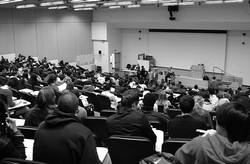When choosing the right college, there are many factors a student takes into consideration. One of the common topics of discussion when choosing a college is the debate between private universities versus public universities.
There are many differences that distinguish a public university from a private university. William Craig, Vice President for Finance, said, “In general, the tuition of private universities will be higher than that of public universities because private institutions receive a large portion of their revenue from tuition and fees paid by their students, gifts from alumni and friends of the institution, and revenue generated by investing endowments that have been accumulated over time. On the other hand, public institutions receive a significant portion of their revenue from the state government.”
According to collegeconfidential.com, private colleges also tend to offer the best financial aid. “The amount of scholarships and grants students receive are often larger at private universities, lowering the actual cost of attendance,” said Craig.
Kimberly Price, first-year student, said, “Finances can affect a student’s decision to attend either a private or public university. Those who struggle financially may choose to attend a public university rather than a private university.”
There is a common misconception that private colleges provide better educations than public colleges, but this idea is unfounded. The price tag of a college does not define its quality of education, nor does it make any one college better than the rest.
“Students can get just as good of an education at a community college as they can get at a private university,” Price added. “People assume that more notable private colleges are better, and that they will receive a better education by attending those universities, but that is not always the case.”
For some, a public college can provide some qualities that a private college may not. Shiza Sarfraz, a Rutgers University student, said, “Public colleges are usually bigger and have a wider range of diversity because the acceptance rate is higher, so the students are exposed to people from all types of different backgrounds.”
Price, a student athlete, also cites ethnic diversity, larger facilities, as well as athletics as a benefit of attending a public college. “The athletic program of public schools may be better because they have more public funding,” she said.
However, private colleges also provide benefits not found in many public universities with large populations. “Private colleges afford students more privacy and smaller class sizes, but these benefits are not necessarily the result of the higher tuition students pay,” Price said.
Overall, what makes one college better than another, whether it is a private or public institution has nothing to do with how expensive the college may be.
“The quality of the education that a student receives is often a product of how well the institution they choose matches their needs and whether the student takes advantage of the opportunities available at the school they attend,” Craig said. “While some students may thrive in a major university with large class sizes, others want a more personal experience where they can exchange ideas with faculty and other students in a small class setting.”
The desires of each individual student should define whether or not a certain school is the right fit, and not the price of the university’s tuition, nor how prestigious the school is.
“While for many students, the cost of attending college is an important factor, it is generally one of many that are considered in deciding where to attend,” said Craig. “The school’s location, size, faculty, class size, facilities, majors offered, and student activities provided are all factors that are considered. Each student has their own set of priorities and will look for the institution that best matches these desires. Personal preferences are important factors in a student’s success.
PHOTO COURTESY of wikipedia.com




